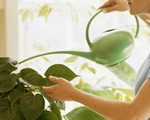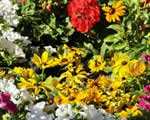 Go to main content
Go to main content
Archive Website of the UK government
Please note that this website has a UK government accesskeys system.
Main menu
Page menu
Environment and greener living

Buying flowers and plants: greener choices

Some flowers and plants sold in the UK have been transported long distances. Some have been grown using fertilisers and pesticides that could harm the environment. There are many ways you can make your choices greener, like opting for seasonal flowers and avoiding plants grown in peat.
Look for organic or locally-grown flowers

You can find organic pot plants at some garden centres, or by searching online
Cut flowers and plants are often grown using peat and fertilisers, and treated with pesticides. The chemicals used can be harmful to the environment, causing water pollution and loss of biodiversity (a wide variety of types of plant and animals).
If you do want to buy cut flowers choose locally-grown blooms, or organic flowers and plants. Organic plants and flowers are grown without using artificial pesticides and fertilisers.
You can find organic pot plants at some garden centres, or by searching online. Organic cut flowers are also available – use the Soil Association link to find a list of organic growers.
Search for Fairtrade flowers
Choosing Fairtrade means supporting companies who treat their workers fairly. Fairtrade organisations also receive money to invest in social or environmental projects that help their communities.
You can find Fairtrade flowers and plants in many high street shops or by searching online. You can also access a list of Fairtrade flower sellers in the UK by using the link below.
Buy flowers that are in season
Buying flowers out of season often means they have been grown in heated greenhouses. This uses a lot of energy and natural resources like water.
You can make less of an impact on the environment by choosing flowers that are in season in the place they’re grown. Use the link below to search for plants and flowers that are in season in the UK.
Avoid peat
When peat is taken from peat bogs, carbon dioxide is released into the atmosphere and this contributes to climate change. Peat bogs also support a wide variety of animals and plants; taking peat can damage this environment.
You can help to protect peat bogs and tackle climate change by avoiding buying plants grown in peat:
- ask your retailer if they sell plants grown in peat-free soil
- search online for ‘peat-free plants’
Consider alternatives to cut flowers
If the cut flowers you want to buy aren’t in season, you could consider choosing an alternative.
Grow your own
If you have a garden, a balcony or a windowsill, growing your own flowers and plants can be a satisfying, cheap and environmentally friendly option. 'Grow your own fruit and vegetables' has information on allotments and community gardening schemes, as well as links to gardening organisations and advice.
Make sure you choose peat-free compost to help them grow – or make your own from kitchen scraps.
Pot plants
Some research has suggested that pot plants improve health, by filtering out pollutants from the air around them. Pot plants usually survive longer than cut flowers, so you may need to replace them less often.
Green gifts
Alternatives to flowers as gifts include locally-produced foods, Fairtrade or organic products, or a present from an online ethical or green gift list. Many environmental charities sell green gifts.
Compost your flowers and plants when they die
The greenest way to dispose of flowers and pot plants when you’ve finished with them is to compost them.
Composting prevents organic waste from ending up in landfill where it produces methane, a powerful greenhouse gas that contributes to climate change.
The wider issue
Most of the flowers bought in the UK are imported, usually inside refrigerated aircraft or lorries. Transporting flowers, and keeping them refrigerated, uses energy and produces greenhouse gases, contributing to climate change.
Cut flowers are often grown using peat and fertilisers, and treated with pesticides. The chemicals used can be harmful to the environment, causing water pollution and less variety in plant and animal life.
More useful links
Useful contacts
In this section...
- Greener furniture, fittings and flooring
- Electrical goods: greener choices
- Clothing: greener choices
- Greener ways to clean
- Buying recycled products
- Food and drink: greener choices
- Water: using less at home
- Greener DIY
- Greener packaging choices
- Choosing 'green' companies
- Shoppers: ways to be greener
- Being greener at home: a quick guide

 Facebook
Facebook Twitter
Twitter StumbleUpon
StumbleUpon Delicious
Delicious Reddit
Reddit

